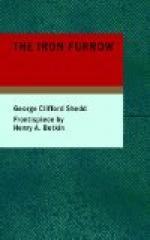“The men are ’all in’,” he told Lee. “We’ll crack this last nut to-morrow.”
“But what if it sets in to snow? More than two hundred and fifty yards left to do, and only to-morrow and the day after to work.”
“We’ll have to risk it.”
“Will your powder hold out?”
“Yes.” He regarded Bryant keenly. “Say, what you need isn’t information but sleep. You worked all day yesterday, and all last night, and to-day again, and here it is going on midnight. I’m going to tell you the schedule for to-morrow to calm your mind, then you roll into your blankets. At nine o’clock in the morning all hands except the cooks go at the drills and stay by them till the stretch is holed. Whenever that’s done, which should be about evening, we shoot the chunk. And after that we hit the bottom with every scraper and fresno and horse and man, with the cooks fighting the coffee-boilers, and never come out of the ditch till the last lump of dirt is moved. That’s the programme. I figure it will be about midnight when the last card’s turned, maybe an hour or so after. I promised the men double wages and a box of cigars apiece out of the store and a few other things perhaps—I don’t remember. So you get your sleep, for there’s a big day ahead to-morrow. That dirt all goes out before you’ll have another chance to hit the hay.”
Bryant arose next morning at seven. The sky was overcast and the thermometer was sixteen below zero when he examined it. Across the snow he could see the north camp stirring to life, awakening in the frosty, pallid light of dawn. Stretching thither ran uneven snowy ridges, save at one place where they lay bare and brown—the banks of the canal. When the small interval still undug was moved, the ditch would be finished from river to ranch, from the Pinas down to Perro. And this was to be the last day of toil! To-day the camps were to hurl themselves at that short remaining strip of earth and tear it out; the furrow so long pressed ahead through the iron ground was to be brought to an end; the enemy, frost, was to be conquered at last. When he thought of the inexorable labour done under heart-breaking conditions, in spite of cold and wind and snow, and with sufferings and deprivations little considered. Bryant felt for the workmen, rough though they were, a strong affection. They had done the bitter work.
“Out goes the chunk to-day,” was Pat’s greeting that morning.
A spirit of eagerness, almost of enthusiasm, pervaded the crews that first went forth in the cold to work at the drills. It was the final attack, and they went from their steaming breakfast with jests and laughter that rang back over the snow. Sixteen below zero, and they laughed! Bryant had a sudden conviction that nothing could stop such men—neither weather, nor elements, nor fate itself. They were heroes not to be daunted. They swung the hammer of Thor against the earth and were worthy of an epic.




